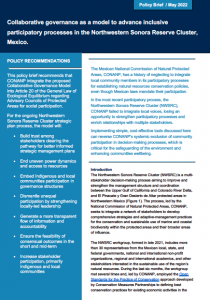Collaborative governance as a model to advance inclusive participatory processes in the Northwestern Sonora Reserve Cluster, Mexico.
I participated in the strategic planning for the Northwestern Sonora Reserve Cluster, a multi-stakeholder decision-making process aiming to define a 10-year socio-environmental management plan for two protected areas: the Upper Gulf of California and Colorado River Delta and the Pinacate and Gran Desierto de Altar biosphere reserves.
The process, led by the National Commission of Natural Protected Areas, incorporated the participation of more than 30 partners, including representatives from the Mexican local, state, and federal government, nonprofits, and academia. However, while participating in the conversations, I noticed the lack of participation among community representatives most impacted by the planning changes, particularly Indigenous communities. I was concerned about it and decided to write a policy brief discussing the implications of power imbalances among partners in the decision-making processes of public affairs, particularly those between Indigenous communities and authorities.
In addition, I learned about the Adaptive Management Process, a systematic approach to improving natural resources management, and the Open Standards for the Practice of Conservation, which focuses on synthesizing goals of human well-being and ecological integrity. I also learned to use Miradi, a software designed to help establish, adapt, and evaluate goals and objectives for the conservation targets identified by partners.
